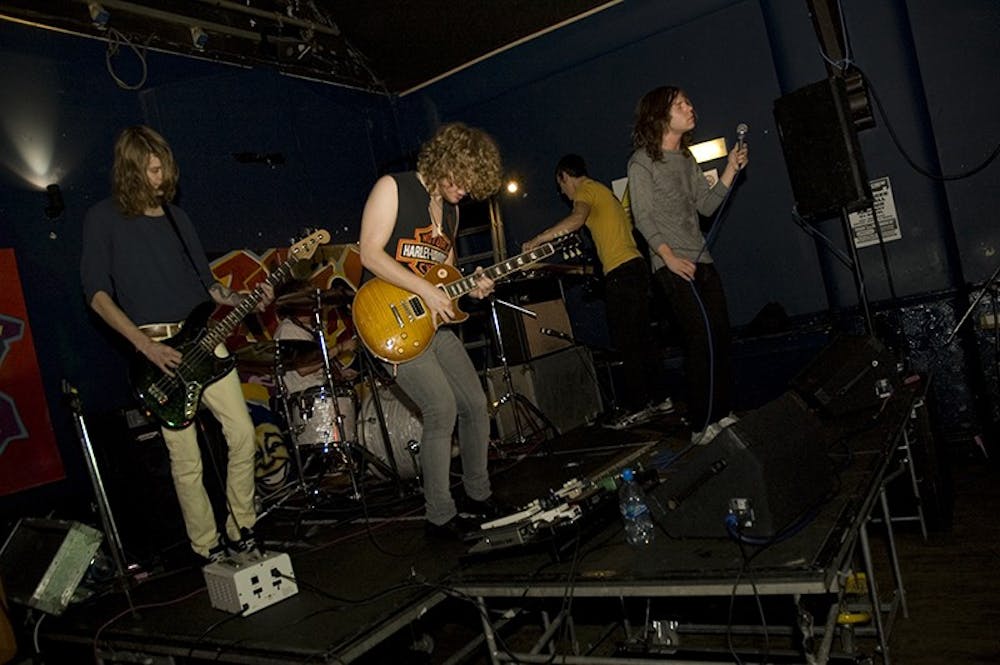Cage The Elephant released their fifth studio album, Social Cues, on Friday, April 18. Cage The Elephant consistently impresses me with the range of music they put out. There are songs I absolutely love, songs I cannot stand listening to and songs that I simply forget. I’ve found that it’s difficult to take in an entire Cage The Elephant album at one time because their music is so high-energy and intense that it’s hard to figure out which tracks I actually enjoy. Social Cues is no exception in that many of the songs blend together on first listen. However, the album definitely has some standouts, and Cage The Elephant never fails to prove their musical prowess.
They open with a bold first track called “Broken Boy,” which really lays the groundwork for the angst of the album. With the first lyric, “I was born on the wrong side of the train tracks,” lead vocalist Matt Shultz really lets us know that he’s upset. While I’m not quite sure what Cage The Elephant is so upset about, it’s certainly a thread that reappears throughout the album.
Other angry tracks include “House of Glass,” released as a single in March, and “Black Madonna,” a song that’s unexpectedly about dissatisfaction with disingenuous people. Because of both their negative lyrics and fast-paced, loud and aggressive musical styles, these kinds of songs happen to be my least favorite on Social Cues. In addition to their generally contentious sound, these songs also all sound pretty similar to one another, which is consistently an issue that keeps me from getting super into Cage The Elephant. Other tracks that seem to blur together include “Social Cues” and “Skin and Bones.” While these songs can sound good in their own right, it’s hard to listen to them all in succession, which is the point of dropping an album.
Thankfully, though, there are always songs that split up the monotony. The most refreshing, different song on Social Cues is “Love’s the Only Way,” a slow (love) song whose string intro, slow pace and sweet lyrics do a perfect job of splitting up the album into more digestible sections. Another personal favorite is “What I’m Becoming,” an apologetic song that plays more with unique sounds. I also appreciate its slower pace, which actually seems to be a trend on the album; the second half of Social Cues offers much slower songs in general. The last track, released in April and aptly titled “Goodbye,” is a lovely but sad song about saying goodbye to someone important, which is a great way to conclude the album. It leaves the listener with a satisfying end to a high-energy album, musically and otherwise.
The two songs that perhaps best exemplify the type of music Cage The Elephant is best known for are “Dance Dance” and “Ready to Let Go,” the first single released from Social Cues. Though “Ready to Let Go” has some serious Black Keys vibes, it has a classic mixture of a heavy, easy-to-follow bassline and a beat that’s impossible to resist tapping your foot to. “Dance Dance,” meanwhile, is even more upbeat. The songs have a heavy rock sound, but enough swing and structure to make them easier to listen to than their more intense songs.
Another noteworthy track is “Night Running,” not only for its Beck feature, but also for the fact that it sounds shockingly like Twenty One Pilots. Unfortunately, because I have an unexplainable chemical aversion to Twenty One Pilots, this song was not of my favorites. Beck, however, is a wildly impressive feature for Cage The Elephant, and he seems like the perfect artist to add something paradoxically similar yet new and unique to their album.
As a whole, I enjoyed Social Cues. My expectations were higher, not only because I already know that I like Cage The Elephant, but also because they’ve been so successful for so long that I was hoping for something really exciting. What I miss most about Cage The Elephant on this most recent album isn’t happy lyrics or more risks, but the genuinely fun part of their music that made their hits like “Rubber Ball,” “Come a Little Closer” and “Cigarette Daydreams” so popular — each song is indescribably unique and inventive. I think, and I hope, that more time with Social Cues will help me appreciate each individual song more.





